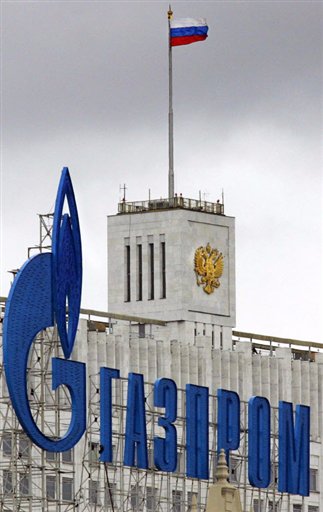
GAZPROM SEDUCING ROMANIAN GOVERNMENT WITH SOUTH STREAM
Publication: Eurasia Daily Monitor Volume: 5 Issue: 204
By:

Romania could be described until now as the staunchest and perhaps last remaining loyalist in the Western-backed Nabucco project. While four of the five Nabucco participant countries (save Romania) and a number of other countries in the region are variously negotiating Russian options, such as South Stream, Bucharest remained staunchly loyal to Nabucco.
This may no longer be the case, however, after last week’s talks with Gazprom in Moscow and yesterday’s news conference by Romanian officials. Contradicting President Traian Basescu’s policy, parts of the Romanian government favor joining Gazprom’s South Stream project, Nabucco’s rival.
Gazprom has skillfully chosen the timing of its move to pry Romania away from the Nabucco project. Romania will hold parliamentary elections in November, pitting the government and the pro-presidential parties against each other. Moscow dislikes Basescu’s policies, oversimplifying them as “anti-Russian” and pro-American. A high-level Gazprom delegation is expected in Bucharest just ahead of the elections to discuss gas supplies and South Stream with the government.
The Romanian president continues unwavering support of Nabucco, as well as other projects to diversify away from dependence on Russia. Speaking on October 22 in the Romanian Black Sea port of Constanta, Basescu called for redoubled international support for Nabucco and other supply diversification projects. Romania wants to build a liquefied-natural-gas terminal in Constanta and is conducting a feasibility study with U.S. Trade and Development Agency support.
Influential members of the government have suddenly veered in a different direction, however. In an October 23 news conference in Bucharest, Economics and Finance Minister Varujan Vosganian (overseeing the energy sector) and Transgaz company general director Ioan Rusu shed some additional light on the initial reports of their Moscow discussions on joining South Stream, possibly displacing Bulgaria (www.transgaz.ro, October 21; see EDM, October 21). According to them, the Romanian ambassador in Moscow initiated the meeting with Gazprom. The Russian side gave Romania “no official invitation” to join South Stream, but it gave “certain signals, to which Romania manifested openness.” Vosganian, who did not attend the Moscow meeting, said that he would comment further after a possible follow-up meeting with Gazprom. The government expects the Russian delegation to arrive in Bucharest with the necessary mandate soon.
Apparently reflecting the view of at least part of the government, these officials argued that Nabucco and South Stream were not competing against each other and were both necessary, as well as Gazprom’s Nord Stream and other projects. Romania wants to participate in as many projects as possible. This marks the first time that Romanian officials have declared an interest in South Stream and a willingness to negotiate with Russia over the pipeline
They also portrayed Romania as better qualified than Bulgaria for Gazprom’s favor. While Bulgaria wants national ownership of the South Stream pipeline on Bulgarian territory, Romanian legislation would allow Gazprom to own South Stream’s section on Romanian territory, with Transgaz operating it and collecting transit revenue.
As explained at the news conference, Romanian legislation that was adopted especially for Nabucco allows foreign ownership of newly constructed transit pipelines on Romanian territory. This could apply equally to South Stream in Romania, in contrast to Bulgaria (Ziua, Evenimentul Zilei, October 24).
With this, Bucharest is apparently rising to Gazprom’s bait, publicly held out in the Russian monopoly’s press release on its Moscow meeting with the Romanians: “We do not rule out Romania’s inclusion in the South Stream project in place of Bulgaria, depending on the level of interest shown by the parties … With regard to the final [choice of] route, transit volumes, and joint management of construction and operation of respective pipeline sections, only one thing can be said: the more effectively the [countries’] negotiations with Gazprom proceed, the faster we can reach agreement on Romania’s possible inclusion in South Stream” (Gazprom press release, October 17, quoted by NewsIn, October 21).
This is an open invitation to Romania and Bulgaria, member countries of the European Union, to compete against each other for Gazprom’s preference and open their doors for a Russian monopoly on EU territory.
Bulgarian Minister of Foreign Affairs Ivaylo Kalfin feels confident that his country is ahead of Romania in the race. Bulgaria signed an agreement with Russia to participate in South Stream in January of this year, during then-president Vladimir Putin’s visit to Sofia. Nevertheless, Moscow is now using Bucharest to pressure Sofia to relent on the issue of pipeline ownership (Kommersant, October 20; Sofia News Agency [Novinite], October 21).
The European Parliament Foreign Affairs Commission Chairman Jacek Saryusz-Wolski, who is intensely involved with energy issues, is publicly encouraging Bucharest, as he has encouraged other government, to “resist South Stream’s temptation”: “You would be left to the supplier’s mercy, pay a price directly proportionate to the level of your dependence, [and] inflict another blow to the Nabucco project.” Instead, Saryusz-Wolski recommends to countries in Central and Eastern Europe to negotiate with Gazprom jointly (NewsIn, October 24). Hungarian MOL’s New Europe Transmission Systems (NETS) pipeline interconnection project can set a basis for such a joint approach.




